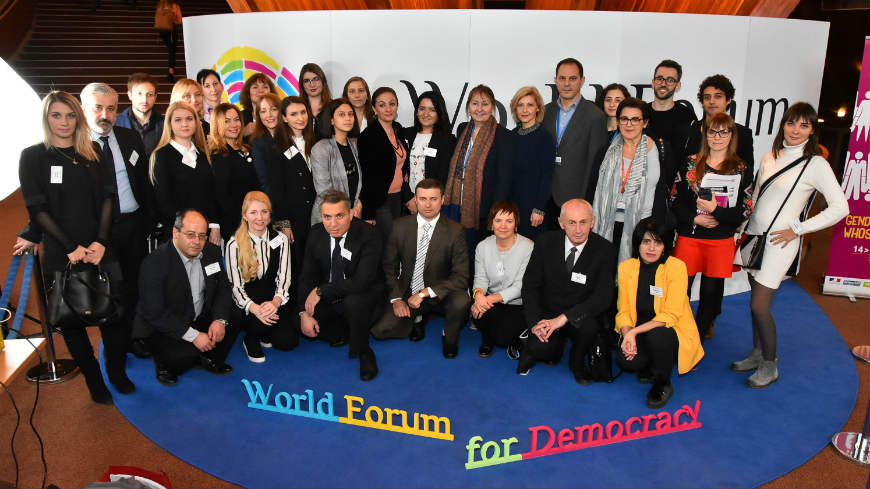“The goal of gender equality is a shared battle, requiring the involvement of men, the media and all levels of government,” stressed Gunn Marit HELGESEN, Vice President of the Congress of Local and Regional Authorities of the Council of Europe encouraging a delegation of 30 Ukrainian and Georgian representatives of local councils, municipal administrations and national associations of local authorities to take further action and promote gender equality in their countries.
“You can seize the opportunity of participating in the World Forum for Democracy in Strasbourg to meet colleagues from other countries around the world and draw on best practices in equality and women's rights,” said Ms HELGESEN during the meeting held on 19 November 2018 in Strasbourg, France. She referred to the World Forum for Democracy’s theme “Gender Equality: Whose Battle?” pointing out that “this battle is not only for women, and it should be everyone’s concern.”
“How to fight stereotypes which suggest that women are not as capable as men of running a town hall? How to strengthen the confidence of women who are afraid to engage in politics? Do you have instances of exemplary co-operation between local authorities and NGOs in the field of women's rights or men who have become role models in advocating for gender equality?” Ms HELGESEN responded to these many questions by first emphasising the need for a legal framework protecting women in all situations.
The World Forum for Democracy 2018 is dedicated to gender equality and women’s rights, with a particular focus on women’s public, political and economic participation and on combating violence against women. It is a unique platform for political decision-makers and activists to debate solutions to key challenges for democracies worldwide.
As a practical follow-up to the Forum, a workshop on “Gender equality at local level: Fostering participation and equal opportunities” to be held on 22 November 2018 will allow Georgian and Ukrainian participants to share experiences and debate the implementation of gender mainstreaming and gender-sensitive policies at local level.
These exchanges are organised by the Congress to build upon previous meetings between Georgian and Ukrainian local authorities and representatives of their national associations during the 5th Open Government Partnership Global Summit held in Tbilisi, Georgia in July 2018 and to implement the Memorandum of Understanding signed between the Association of Ukrainian Cities and the National Association of Local Authorities of Georgia in June 2017.
This study visit is organised as part of the project ‘Strengthening democracy and building trust at local level in Ukraine’, implemented as part of the Council of Europe Action Plan for Ukraine 2018-2021. This project aims to improve the quality of local democracy in Ukraine by strengthening institutional frameworks and by supporting local authorities and their national associations in their efforts to promote ethical decision-making and more citizen-oriented, inclusive, responsive and transparent local governance.
Contacts:
Marité MORAS, Head of Unit, Co-operation and External Relations Department, Congress of Local and Regional Authorities of the Council of Europe, Tel: +33 3 88 41 22 33
Svitlana GRYSHCHENKO, Project Manager, Council of Europe Office in Kyiv, Tel: +380 96 340 13 83




